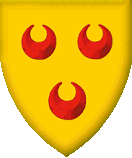
The Name of Seton and the Descent Charts
|
It was during the reign of King David I that the Seton Family firmly established themselves in Scotland. Before that the family was previously known as de Lens, of the House of Boulogne and seniors of the ancient Carolingian line descended from the Emperor Charlemagne from the eldest son of Count Lambert de Lens from his first marriage. It was Count Lambert's eldest son, Seier de Lens who held lands in both Northumbria and Scotland. It appears that Seier's Christian name is unknown, for Seier is the old French name for Baron, however his brother was called Walter, or Walcher. There is no correct method on how to write the family name, however, it should be pointed out that the S-E-T-O-N version is acknowledged as the Scots version, and the S-E-A-T-O-N being the Anglized or British version. The S-E-E-T-O-N version seems to have been used mostly in Aberdeenshire and Ireland predominantly, though periodically found throughout Britain, and the S-E-Y-T-O-U-N form is almost certainly the oldest. The following example of Scots writing from the 17th century serves to illustrate the language which gave rise to the various spellings and is as follows: Maister Jhone Forbes, (Master John Forbes) maist worthie of credeit, (most worthy of credit) Yit came thair neiuer to me sik a greiff in hairt and minde, as I reasued be yiour heighness sould suspect ony sik thing off me. It has wounded me sua, that it has putt me fra all other thocht or cair; for as I wald think myself onwordie to be leiuand, gif I haid committed sa filthe an errour, sua man I disdane baith my lyff and haill estaitt, sa lang as I am in feare my maist gracious souerane has onye suspicion I be onye wayis giltie of sa abominabill crime.Chancellor Alexander Seton, to his King James VI and I, 1604 (It was mostly during this period that the majority of variations that we now know of arose). Variances include: Ventoun, Setoniis and Seamon, Sietoun, Saytoun, Seytoune, Setoune, Settoun and Saiton.
|
Click to View: The Seton Descent The Main Seton Line The Principle Family Cadets
